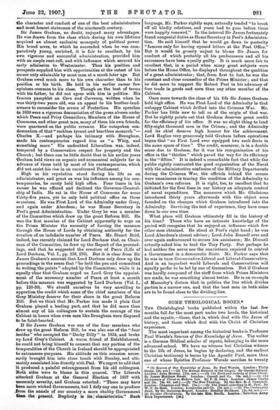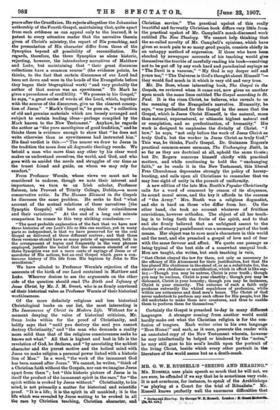SOME THEOLOGICAL BOOKS.*
THE Ohristological hooks published within the last few months fall for the most part under two heads, the historical and the mystic,—those, that is, which deal with the Jesus of history, and those which deal with the Christ of Christian experience.
The most important among the historical books is Professor Paul Wernle's Sources of Our Knowledge of Jesus. The writer is a German Biblical scholar of repute, belonging to the more advanced school. We have no witness but Christian witness to the life of Jesus, he begins by declaring, and the earliest Christian testimony is borne by the Apostle Paul, more than one of whose Epistles Professor Wernle ascribes to twenty • (1) Sources of Oar Knowledge of Ian& By Paul Wernle. London: Philip Green. (2s. net. —(2) The Human Element is the Gospel.. By George Barn... London: John nrray. [15e. net.1—(9) The Birth and Infancy of Jams Christ. By James Matthew Sweet. London: Cassell and Co. 16a stet.]—(41 The Immanence of Christ in Modern Life. By F. B. Swan. London: James Clarke and CO. Os. 6d. net.1—(5) The New Theology. By the Bee. B. J. Campbell. London: Chapman and Hall. [6a.]—(6) The Gospel a000rding to Bt. Paul. By W. P. da Bose. London: Longman and Co. Da net.]—(7) The Unchanging j.34.f.DrointanlyliotnyrthelazIorr,te.HeaB=Brothen,
gimk Department, [la.]
years after the Crucifixion. He rejects altogether the Jobannine authorship of the Fourth Gospel, maintaining that, quite apart from such evidence as can appeal only to the learned, it is patent to every attentive reader that the narrative therein given of Christ's ministry, the report of His preaching, and the presentation of His character differ from those of the Synoptics beyond all possibility of reconciliation. He regards, therefore, the three Synoptics as alone historic, rejecting, however, the introductory narratives of Matthew and Luke, but maintaining that " their great discourse collections have a common source" (the evidence points, he thinks, to the fact that certain discourses of our Lord had been set down and were in the hands of the Evangelists before they began their biographical work) " and very probably the author of that source was an eyewitness." To Mark he gives a precedence of credibility. " We possess in hie Gospel," be says, " a great series of words of the Lord, which, together with the source of the discourses, give us the clearest concep- tion of Jesus." "Mark's Gospel is," he goes on, "a collection of old and genuine materials which are loosely arranged and subject to certain leading ideas—perhaps compiled by the Mark known to the New Testament." Anyhow, he regards the author as "the pure mouthpiece of good tradition," andhe thinks. there is evidence enough to show that "be does not write otherwise than as eyewitnesses had instructed him." His final verdict is this :—" The nearer we draw to Jesus in the tradition the more does all dogmatic theology recede. We behold a man who more than any other by his clear word makes us understand ourselves, the world, and God, and who goes with us amidst the needs and struggles of our time as the truest friend and guide, on whom we may rely for eomfort."
From Professor Wernle, whose views we must not be considered to endorse, though we note their interest and importance, we turn to an Irish scholar, Professor Salmon, late Provost of Trinity College, Dublin,—a more conservative critic. In The Human Element in the Gospels he discusses the same problem. He seeks to find "what account of the mutual relations of these narratives [the Synoptic Gospels] will best explain their coincidences and their variations." At the end of a long and minute comparison he comes to this very striking conclusion :— " The most probable explanation of the fact that we have now three histories of our Lord's life so like one another, yet in many parts so independent, is that we have preserved for us the oral Gospel as delivered at three different centres ; and that these three versions should have so many points of agreement, both in the arrangement of topics and frequently in the very phrases employed, justifies the belief that the common element of our three Synoptics was not a mere canto of sayings of Jesus or of anecdotes of His actions, but an oral Gospel which gave a con- tinuous history of His life from His baptism by John to His crucifixion."
We have alluded to Professor Wernle 's rejection of the accounts of the birth of our Lord contained in Matthew and Luke. Whoever desires to see the arguments on the other aide of the question should read The Birth and Infancy of Jesus Christ, by Mr. J. M. Sweet, who is as firmly convinced of, their historical value as Professor Wernle of their historical worthlessness.
Of the more definitely religious and less historical Christological books on our list, the most interesting is The Immanence of Christ in Modern Life. Without for a moment denying the value of historical criticism, Mr. Swan looks within for the proof of Christianity, and boldly says that " until you destroy the soul you cannot destroy Christianity," and " the man who demands a reality more solid than that of the religious consciousness seeks he knows not what." All that is highest and best in life is the revelation of God, he declares, and " by associating the noblest character and the purest motive and the holiest mind with Jesus we make religion a personal power linked with a historic Son of Man." In a word, "the work of the immanent God has been named after Jesus." We cannot, he writes, "think of a Christian faith without the Gospels, nor can we imagine Jesus apart from them "; but "this historic picture of Jesus is in itself the product of the immanent spirit in the race," for "the spirit within is evoked by Jesus without." Christianity, to his mind, is not primarily a matter for historical and scientific proof. "It is a life; it is the spirit in all mankind; it is the life which was revealed by Jesus waiting to be evoked in all the race by Christian teaching, Christian character, and
Christian service." The practical upshot of this really beautiful and fervently Christian book differs very little from the practical upshot of Mr. Campbell's much-discussed work entitled The New Theology. We cannot help thinking that the so-called novelty of Mr. Campbell's opinions, which have given so much pain to so many good people, consists chiefly in an unhappy method of expression. If those who have been shocked by newspaper accounts of his teaching would give themselves the trouble of carefully reading his book—resolving not to be put off by any such hard and paradoxical sayings as "The Devil is a vacuum," "My God is my deeper self and yours too," "The Universe is God's thought about Himself "- they would find much in it which is very old and very true.
Mr. Du Bose, whose interesting book, The Gospel in the Gospels, we reviewed when it came out, now gives us another upon much the same lines entitled The Gospel according to St. Paul. It is the risen Christ, he believes, who reveals to us the meaning of the Evangelist's narrative. Humanity, he says, "was predestined for the Gospel in the sense that the Gospel, which is Jeans Christ Himself, is the natural, more than natural, supernatural, or ultimate highest natural end or completion, and so predestination, of humanity." His work is designed to emphasise the divinity of Christ. "I bow," he says, "not only before the work of Jesus Christ as truly God's, but the worker in Jesus Christ as truly God." This was, be thinks, Paul's GospeL Dr. Guinness Rogers's practical common-sense sermons, The Unchanging Faith, in so far as they are doctrinal at all, uphold the same thesis ; but Dr. Rogers concerns himself chiefly with practical matters, and while continuing to hold the " unchanging faith," as he reads it in the New Testament, this liberal Free Churchman deprecates strongly the policy of heresy- hunting, and calls upon all Christians to remember that we may lose sight of unity in the pursuit of uniformity.
A new edition of the late Mrs. Booth's Popular Christianity calls for a word of comment by reason of its eloquence, its sound moral sense, and the key it affords to the success of "the Army." Mrs. Booth was a religious dogmatist, and she is hard on those who differ from her. On the other hand, she took no account whatever of fruitless convictions, however orthodox. The object of all her teach- ing is to bring forth the fruits of the spirit, and to that end she firmly believed that an unfeigned assent to the doctrine of eternal punishment was a necessary part of the best means. Her object was to save men's characters in this world and the next, and she preached a gospel of love and of fear with the same fervour and effect. We quote one passage as being typical of the best side of a somewhat unequal book. Men are taught, she writes, but such teaching is vain, "that Christ obeyed the law for them, not only as necessary to the efficacy of His Atonement for their justification, but that He has placed MB obedience in the stead of, or as a substitute for, thek sinner's own obedience or sanctification, which in effect is like say- ing :—Though you may be untrue, Christ is your truth ; though yen may be unclean, Christ is your chastity ; though you may be dishonest, Christ is your honesty; though you may be insincere, Christ is your sincerity. The outcome of such a faith only produces outwardly the whited sepulchres of profession, while within are rottenness and dead men's bones. The Christ of God never undertook to perform any such offices for His people, but He did undertake to make them new creatures, and thus to enable- them to perform them for themselves."
Certainly the Gospel is preached to-day in many different languages. A stranger coming from another world could hardly make out what the Christian religion is for the con- fusion of tongues. Each writer cries in his own language "Ecce Homo!" and each, as it were, presents the reader with an annotated copy of the New Testament wherein, however he may intellectually be helped or hindered by the "notes," he may still gaze to his soul's health upon the portrait of the living Christ, beside which every other portrait in the- literature of the world seems but as a death-mask.











































 Previous page
Previous page